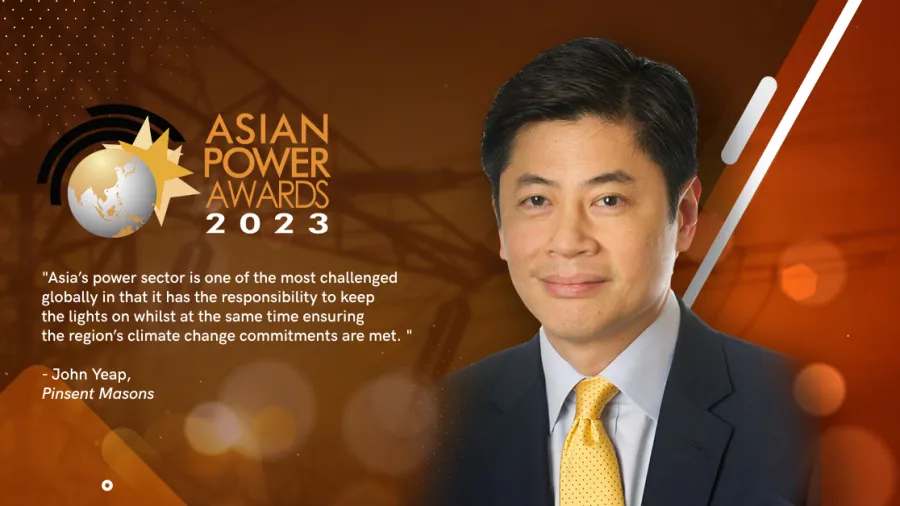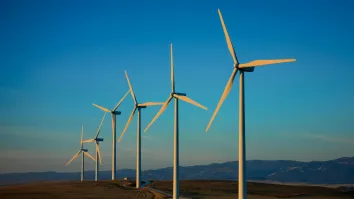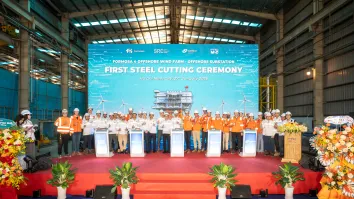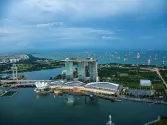
Pinsent Masons’ John Yeap: Government commitment, regulatory certainty pivotal steps in encouraging industry engagement
Robust and well-defined regulatory frameworks create an environment of transparency and predictability, allowing industry players to make long-term investments and innovations.
The Asian energy industry stands at a pivotal juncture, where rapid economic growth intersects with the pressing need for sustainable and climate-conscious energy solutions. In this dynamic landscape, experts like John Yeap, Consultant of Energy & Infrastructure for Pinsent Masons, play a critical role in guiding the industry towards a cleaner and more sustainable future.
Yeap's career spans over three decades in the energy sector and has equipped him with a profound understanding of the intricate workings of Asia's energy landscape. Holding a leadership role in Pinsent Masons' climate change and energy transition endeavours across Asia, Yeap's expertise extends beyond renewable energy to encompass broader themes like green financing, ESG (Environmental, Social, and Governance) considerations, and decarbonisation.
Having witnessed Asia's energy industry evolve through economic and technological cycles, his aspirations likewise align with supporting Asian economies as they embark on the ambitious journey of decarbonisation.
In an interview with Asian Power, Yeap provides valuable perspectives on the challenges and opportunities that shape the Asian energy sector. Yeap emphasised the need for robust regulatory frameworks that foster transparency and attract investment capital for innovative technologies. He also suggested supplementing solar energy with other technologies, highlighting the need for a strategic approach to transition.
From your perspective, what are the key obstacles that need to be addressed to ensure efficient energy markets in the region? Are there any innovative approaches or solutions that you believe can help overcome these challenges?
Efficiency in energy markets is driven by optimal utilisation of resources. This requires robust regulatory frameworks to ensure a transparent and financeable energy market, which would in turn enable industry stakeholders to deploy the capital required to invest in new technology. A clear path to achieving Net Zero whilst meeting demand growth will also be required. These are not easy challenges for economies in this region to address, and the starting point must be government commitment and action to provide stakeholders with the required regulatory certainty.
In the context of Asia, which specific emerging technologies do you see as having the most potential to drive sustainable energy development, and how can they be better utilised to accelerate energy transition?
Asia generally has coal-fired power plants with significant asset life remaining. The move towards a sustainable energy sector will require careful management of such fossil-based plants. A replacement strategy has to be implemented that recognises the continued importance of such plants in the short to medium term, particularly given the increasing demand growth across the region. Solar will undoubtedly continue to play a pivotal role, but as most of Southeast Asia’s nations are land constrained, that role has to be supplemented by other technologies. Countries further away from the equator, particularly those with good coastal winds, will likely see offshore wind increasingly form part of their generation mix. In the longer term, a solution of green hydrogen will, as elsewhere, be an important and integral part of the region’s sustainable energy solution.
As the focus on ESG factors continues to grow, how do you see the role of ESG metrics and reporting in driving sustainable energy development in Asia?What challenges and opportunities do you foresee in the integration of ESG considerations into energy projects and investments?
ESG, despite its critics, will continue to be increasingly important in the region. With its roots in public capital markets in the developed world, compliance with ESG metrics will be an unavoidable aspect of the region’s activities. We are already seeing increasing awareness of ESG across various aspects of the region’s energy sector, including with regards to Just Transition considerations as the energy industry transitions away from fossil-intensive plants.
International collaboration and knowledge sharing are crucial for accelerating energy transition efforts globally. In your experience, how can countries in the Asian region collaborate effectively with each other and with international partners to advance sustainable energy goals and share best practices?
An interesting development in the region is the increasing focus on intra-regional trading of renewable energy. We see wind power being exported from Laos to Vietnam. Singapore is implementing a policy to import renewable energy from neighbouring countries. As the region improves grid connectivity, such collaboration on utilising renewable energy resources across the region will likely increase.
Looking ahead, what are your hopes and aspirations for the energy transition in Asia? Are there any specific milestones or achievements that you would like to see in the region's journey towards decarbonisation and sustainable energy systems?
Very similar to the above, an important development to aspire to will be greater intra-regional cooperation on renewable energy, based on increased grid connectivity and optimal utilisation of renewable energy resources across the region.
As a judge at the Asian Power Awards, you evaluate nominees for outstanding energy projects. Could you elaborate on the qualities you look for when assessing these projects?
Asia’s power sector is one of the most challenged globally in that it has the responsibility to keep the lights on whilst at the same time ensuring the region’s climate change commitments are met. These are not contrary objectives but require careful management and innovative considerations of the opportunities and challenges. Nominees that demonstrate achieving thesetwin objectives are important qualities to look for.

















 Advertise
Advertise







